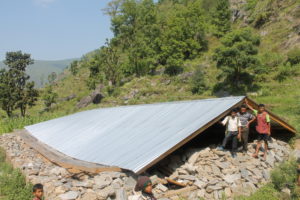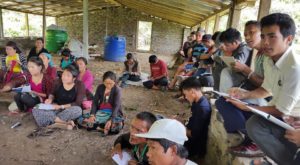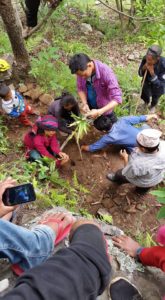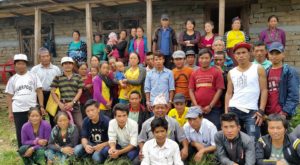Six months after the devastation of the Gorkha earthquake, Tawal area villagers were still coming to terms with the massive loss of property and sadly, the loss of 72 loved ones. All 1,223 houses, schools, and other valuable infrastructure in the area were destroyed. The three buildings owned by the local Pasang Chowk Agricultural Co-operative: two sheds for egg laying and broiler chickens and the Co-operative’s caretaker’s cottage, were reduced to rubble.
The Co-operative operates out of Tawal the largest village in the area. It is an initiative driven entirely by the villagers themselves. In 2013, 230 farmers from four villages pooled their financial resources with the aim of working co-operatively to move from subsistence farming to high value cash crops. The hope was to provide a sustainable economic future for the their communities. NAFA had provided $2,447 for irrigation pipes to the land purchased by the fledging Cooperative. The Gorkha earthquake was a huge set back to the villagers’ hopes and efforts.
Once the crisis phase of the earthquake had passed, villagers began to plan for recovery. Restoration of the Agricultural Co-operative was high on the recovery agenda, as villagers realised how important it was to keep the economic momentum going. NAFA approved a grant of $15,000 to replace the three destroyed sheds and repair the water infrastructure to the land. Co-operative members quickly completed the rebuilding of the chicken sheds and in meetings came up with new ideas for selling products as a group to get better prices. NAFA also submitted a proposal to the English Family Foundation to restore and expand the overall functioning of the Co-operative. In late March 2016 wonderful news came through – the application was successful!
The funding from the grant will provide training in cardamom and coffee growing; 20,000 cardamom plants; training in goat rearing and goats to a pilot project for ten women; goat sheds; solar panels for the chicken sheds; a caretaker’s salary for one year; funding to train an Agricultural assistant; and a coffee pulping machine. Trainers will follow up at a later date to ensure proper techniques are being applied. Members were overwhelmed with excitement and appreciation regarding the grant.
Since receiving the grant, Co-operative members have organised the cardamom and goat training, involving 80 farmers (including both men and women), purchased the cardamom plants and are in the process of bringing the goats from Nuwakot district (near Kathmandu) to Tawal. Their capacity and enthusiasm is all the more remarkable when you consider the challenges they are facing on all fronts. They have gone through one monsoon season making do with sub-standard housing and classrooms, and now face another wet and land-slide prone four months.
Many families are rebuilding their homes without government assistance, and all are involved in repairing community assets such as paths between villages, water infrastructure, an emergency helicopter pad, the micro-hydro system, and the community shelter deep in the forest. Additionally much time is spent resolving complications such as how to bring 210 pieces of gabion (wire boxes) to Tawal to build a protective barrier against landslides around the proposed school site. This all takes place without respite from working the crops each day to bring food to the family.
The grant from the English Family Foundation has the potential to bring about positive changes in economic development and spin offs in improvements in education and health. It also provides a significant psychological boost to community members. When informed of the grant, Kanchha Tamang, president of the Co-operative, spoke of a brighter future: “So we are sharing this great news to all Cooperative members as soon as (possible) with big meeting. We hope fully now our Cooperative’s future will be bright by this project. We will invest this budget and we hope in agriculture area will get change… from our side thanks very much to NAFA and English (Family) Foundation”.




